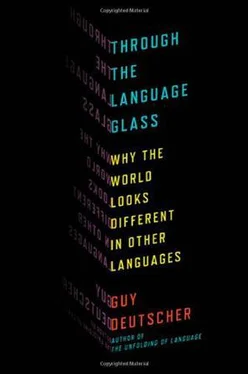What is more, there are odd pairs of languages around the world that are spoken in similar environments but have nevertheless chosen to rely on different coordinate systems. Tzeltal, as we have seen, uses geographic coordinates almost exclusively, but Yukatek, another Mayan language of a rural community from Mexico, predominantly employs egocentric coordinates. In the savannah of northern Namibia, the Hai||om bushmen speak about space like the Tzeltal and Guugu Yimithirr, whereas the language of the Kgalagadi tribe from neighboring Botswana, who live in a similar environment, relies heavily on egocentric coordinates. And when two anthropologists compared how Hai||om and Kgalagadi speakers responded to rotation experiments of the type we saw earlier, most Hai||om speakers offered geographic solutions (like the one that seemed counterintuitive to us), whereas the Kgalagadi tended to give egocentric solutions.
So the coordinate system of each language cannot have been completely determined by the environment, and this means that different cultures must have exercised some choice. In fact, all the evidence suggests that we should turn to the maxim “freedom within constraints” as the best way to understand culture’s influence on the choice of coordinate systems. Nature-in this case the physical environment-certainly places constraints on the types of coordinate system that can be used sensibly in a given language. But there is considerable freedom within these constraints to select from different alternatives.
There is another critical error in Pinker’s environmental determinism, namely his glossing over the fact that the environment does not interact directly with a toddler or small child-it does so only through the mediation of upbringing. To clarify this point, we need to keep two different issues strictly apart. The first is the question of what the historical reasons were that caused a certain society to home in on a certain system of coordinates. The second issue, which is the one that is actually relevant for us here, is what happens to John Smith, an individual speaker of a Guugu Yimithirr-style language, when he grows up, and in particular what was mainly responsible for bringing about his perfect pitch for directions. Suppose we had evidence that John’s skill developed only in his late teens or early twenties, after he had been on countless hunting expeditions and has spent thousands of hours of trekking in the wild. The argument that language had much to do with creating this skill would have looked rather feeble, since it would have been far more plausible that this skill developed as a direct response to the environment, that the training and drilling came from his experiences of hunting and trekking and so on. But as it happens, we know that the geographic coordinate system is learned at a very early age. Studies of Tzeltal-speaking children show that they start using the geographic vocabulary by age two, that by age four they use geographic coordinates correctly to describe the arrangement of objects, and that they master the system by age seven. Alas, Guugu Yimithirr children no longer acquire the system at all, because the community is now dominated by English. But studies with Balinese children show similar results to Tzeltal: children in Bali use geographic coordinates by age three and a half and master the system by age eight.
At the age of two or three or even seven, John Smith has no idea about the reasons why his society, centuries or millennia ago, chose this or the other coordinate system, and whether that choice was suitable for the environment or not. He simply has to learn the system of his elders as given. And since constant and unfailing awareness of directions is required to use the geographic system correctly, John Smith must have developed his perfect pitch for directions at a very young age, long before it could have been a direct response to the needs of survival in the physical environment, the exigencies of hunting, and so on.
All this goes to show that the system of coordinates you speak and think in is determined for you not directly by the environment but rather by the way you were brought up-or, in other words, through the mediation of culture. Of course, one may still object that there is more to the way one is brought up than just language. So we cannot simply take for granted that language in particular, rather than anything else in a Tzeltal or Guugu Yimithirr speaker’s upbringing, was the primary reason for inducing geographic thinking. I have argued that the main cause here is simply the constant need to calculate directions in order to speak and understand others. But at least in theory, one cannot rule out the possibility that children develop their geographic thinking for an entirely different reason, say because of intense explicit tuition in orientation from an early age.
In fact, there is one example in our own egocentric system of coordinates, the left-right asymmetry, which teaches us to be cautious. For most Western adults, left and right seem second nature, but children have great difficulties in mastering the distinction and generally manage it only at a very late age. Most children cannot cope with these concepts even passively until well into school age and don’t use left and right actively in their own language until around the age of eleven. This late age of acquisition, and especially the fact that children often master the distinction only through the brute force of schooling (including, of course, the need to acquire literacy and master the inherent sidedness of letters), makes it unlikely that the left-right distinction was acquired simply through the requirements of daily communication.
But while the left-right distinction in our own egocentric system serves as a warning against jumping to conclusions about causation, the marked difference between the late acquisition of left-right and the early acquisition of geographic coordinates highlights exactly the reasons why, in the latter case, language is by far the most plausible cause. There is no evidence of formal tuition in geographic coordinates at an early age (although there is evidence from Bali of some geographically relevant religious practices, such as putting children to bed with the head pointing in a particular geographic direction). So the only imaginable mechanism that could provide such intense drilling in orientation at such a young age is the spoken language-the need to know the directions in order to be able to communicate about the simplest aspects of everyday life.
There is thus a compelling case that the relation between language and spatial thinking is not just correlation but causation, and that one’s mother tongue affects how one thinks about space. In particular, a language like Guugu Yimithirr, which forces its speakers to use geographic coordinates at all times, must be a crucial factor in bringing about the perfect pitch for directions and the corresponding patterns of memory that seem so weird and unattainable to us.

Two centuries after Guugu Yimithirr bequeathed “kangaroo” to the world, its last remaining speakers gave the world a harsh lesson in philosophy and psychology. Guugu Yimithirr proved-tongue on teeth-that a language can do perfectly well without concepts that had long been considered as universal building blocks of spatial language and thought. This recognition illuminated concepts of our own language, which our common sense would have sworn were simply decreed for us by nature, but which only seem so because our common sense happened to grow up in a culture that employs these concepts. Guugu Yimithirr provided a glaring example-brighter even than the language of color-of cultural conventions that masquerade as nature.
What is more, the research that Guugu Yimithirr inspired has furnished the most striking example so far of how language can affect thought. It has shown how speech habits, imprinted from an early age, can create habits of mind that have far-reaching consequences beyond speaking, as they affect orientation skills and even patterns of memory. Guugu Yimithirr managed all this just in time, before finally going west. The “unadulterated” language that John Haviland started recording from the oldest speakers in the 1970s has now gone the way of all tongues, together with the last members of that generation. While the sounds of Guugu Yimithirr are still heard in Hopevale, the language has undergone drastic simplification under the influence of English. Today’s older speakers still use cardinal directions fairly frequently, at least when they speak Guugu Yimithirr rather than English, but most people younger than fifty have no real grasp of the system.
Читать дальше












